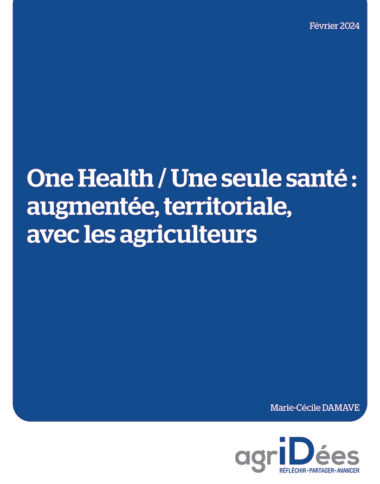Notes
Temps de lecture : 5 min
19/02/2024
One Health: for an augmented and territorial system, with farmers

The Covid-19 pandemic has underlined the need to boost preventive healthcare. The health crisis has had global public health and economic implications. It was due to a zoonotic disease, i.e., that it can be transmitted from humans to animals and vice versa. The development of such diseases, which account for most of emerging diseases in humans, is favored by human activities, international trade, climate change and the degradation of biodiversity. The intensification and complexity of environmental, climatic and health challenges are urging us to better protect and organize ourselves, collectively. The One Health approach, based on the interdependence of human, animal and environmental health, makes perfect sense for addressing future pandemics more effectively. However, One Health is proving difficult to put in practice in the field. This approach must become effective, both to improve our health and to prevent and better manage future health crises. We recognize the human-centric nature of this approach, which seeks above all to guarantee people’s good health.
Résumé
We recommend to articulate One Health as a system, an unstable balance in which not only ecosystems and all living beings interact (human, animal, and environmental health, with the addition of soil and plant health), but also economic health. To become an effective monitoring and prevention instrument, this « augmented One Health « system needs to be implemented at the regional level, where local (public and private) players can assess and improve its various dimensions over time and space, using local health indicators. We are convinced that the farming community pays a major part in the implementation of the augmented and territorial One Health. Farmers and ranchers are located at the core of our territories, and already play a central part in One Health because they have the capacity to act locally on ecosystems balance. As genuine entrepreneurs and key stakeholders in the food chain through their production activities, they actively contribute to regional economic dynamics.
Farming often gets poor reviews, particularly because, along with other sectors, farming contributes to chemical pollution of the environment and greenhouse gas emissions. Agriculture is indeed partly responsible for these issues, but this must be put in perspective. The dramatic rise in farm and food production in France and Europe since World Ward II has above all ensured France and the continent’s food security, an essential factor contributing to good health. Moreover, farming practices have become more virtuous (reduced use of antibiotics, improved animal welfare, stricter regulations on phytosanitary products, development of agroecology, etc.), while simultaneously integrating economic and environmental sustainability objectives. On another note, consumers’ food choices that may present risks for their health and lead to obesity or excessive alcohol consumption, are in no way the farmers’ responsibility.
In our views, farmers have the power to set the One Health system on a virtuous course by embarking on two different paths. First, engaging in sustainable food chains, leveraging prevention and health (for example, engaging in local food projects or PAT, or in new legume value chains). Structuring sustainable food supply chains on a regional scale generates value that is not only economic, but also offers potential benefits in all health dimensions. Second (and the two paths are not mutually exclusive), embarking on the transition to regenerative agriculture, including the adoption of practices and techniques that are beneficial to the environment and to food safety (sustainable, environmentally friendly, low-carbon, regenerative organic, conservation agriculture), with high standards of animal welfare and always a source of healthy food.
We have identified two major conditions for an augmented and territorial One Health to be deployed, with farmers: public policy and technological innovations. In terms of public policies, we believe it is essential to ensure consistency among existing French and European public policies on health, the environment and food, with a benefit/risk assessment of the impact of measures on all One Health compartments, including the economic dimension (gains/costs). We also recommend to incentivize and reward farmers to adopt effective preventive health practices by setting up a system of Payments for Public Health Services, along the lines of Payments for Environmental Services, which could, at least in part, be funded by public health authorities. Also, the rules governing the placing on the market, use and end-of-life management of plant protection products, as well as animal and human health products, need to be harmonized. This would provide greater consistency and fairness among stakeholders in the various compartments of One Health, and ensure that these rules are better understood by operators and citizens. Finally, professionals and individuals, young and old, will need to acquire common-sense notions of self-care based on science, thanks to a healthy and sustainable diet, and good practices in the use of health products, for example by participating to One Health Fresks.
Accelerating the deployment of technological innovations is essential to make One Health more operational and territorial. In order to describe the complete «One Health» state of a territory with relevant indicators, to anticipate and manage health risks, using digital technology seems essential. Data from different health compartments need to be interoperable to interlink existing surveillance platforms (health monitoring and emergencies in human health, food chain surveillance, plant and animal health, water and air quality and biodiversity monitoring) to develop predictive models for anticipating and modeling risks in territories. For farmers, this means accelerating the deployment of AgTech tools for precision farming and breeding, which have become essential to speed up the agroecological transition to regenerative agriculture and carbon farming in particular. Other relevant innovations include biobased solutions (such as biocontrol, biostimulants and biofertilizers) and innovative plant breeding to limit the use of synthetic chemicals and improve carbon footprint, which deserve to be more widely adopted. Solutions based on the microbiome, which are still at the research and development stage, are still insufficiently renowned.
It must become possible for the farming community to contribute to developing and improving local One Health indicators, in order to implement the National Environmental Health Programs (PNSE) at regional levels. It is clear that good farming practices, promoted in the food chain, are one of the cornerstones of an augmented, territorial and effective One Health system, enabling us to address health risks and sustainably build healthy regions. Acknowledging and rewarding farmers as champions of health in the field can only motivate them and make them proud of their work!
Nos propositions
Our Recommendations
1. Extend the scope of the One Health approach to include soil and plant health, and integrate an economic dimension. Define and measure One Health at the level of a territory (especially the administrative Region), using indicators of economic health, the health of inhabitants, animals, plants and soils, water and air quality, as well as biodiversity. Measure the evolution of these data over time to improve territorial health conditions.
2. Encourage stakeholders in the food chain to produce and supply sustainable food locally to leverage prevention for local residents and for the benefit of economic health of the region, notably on the basis of relevant and sustainable local food projects (PAT). Support farmers’ transitioning to good farming practices (agroecological practices, low-carbon agriculture, regenerative agriculture, soil conservation, animal welfare, sustainable animal husbandry, etc.) with training and Payments for Public Health Services, a type of Payments for Environmental Services extended to these objectives, by public health authorities.
3. Accelerate the inventory, interoperability and data processing to better predict and manage health risks by crossing monitoring data from all health sectors (human, animal, plant, soil, food safety, water and air quality, state of biodiversity) at the level of a territory. Encourage the adoption of precision farming and breeding tools in this context.
4. Align regulations and impact studies (on the environment, on organisms and populations) for molecules used in human health (drugs, essential oils, dietary supplements, etc.) with those used in animal health (drugs, antibiotics, dietary supplements, essential oils, etc.) and plant health (phytosanitary products, biosolutions). Bring obligations in line between professional and private use of health products (phytosanitary products, antibiotics, etc.) and practices (nutrition, animal welfare).
5. Provide science-based training to all generations integrating the benefit/risk approach and the risk/danger distinction. Empower them to acquire common-sense habits of self-care (in particular with nutrition as prevention) as well as for animal, plant and environmental health.


